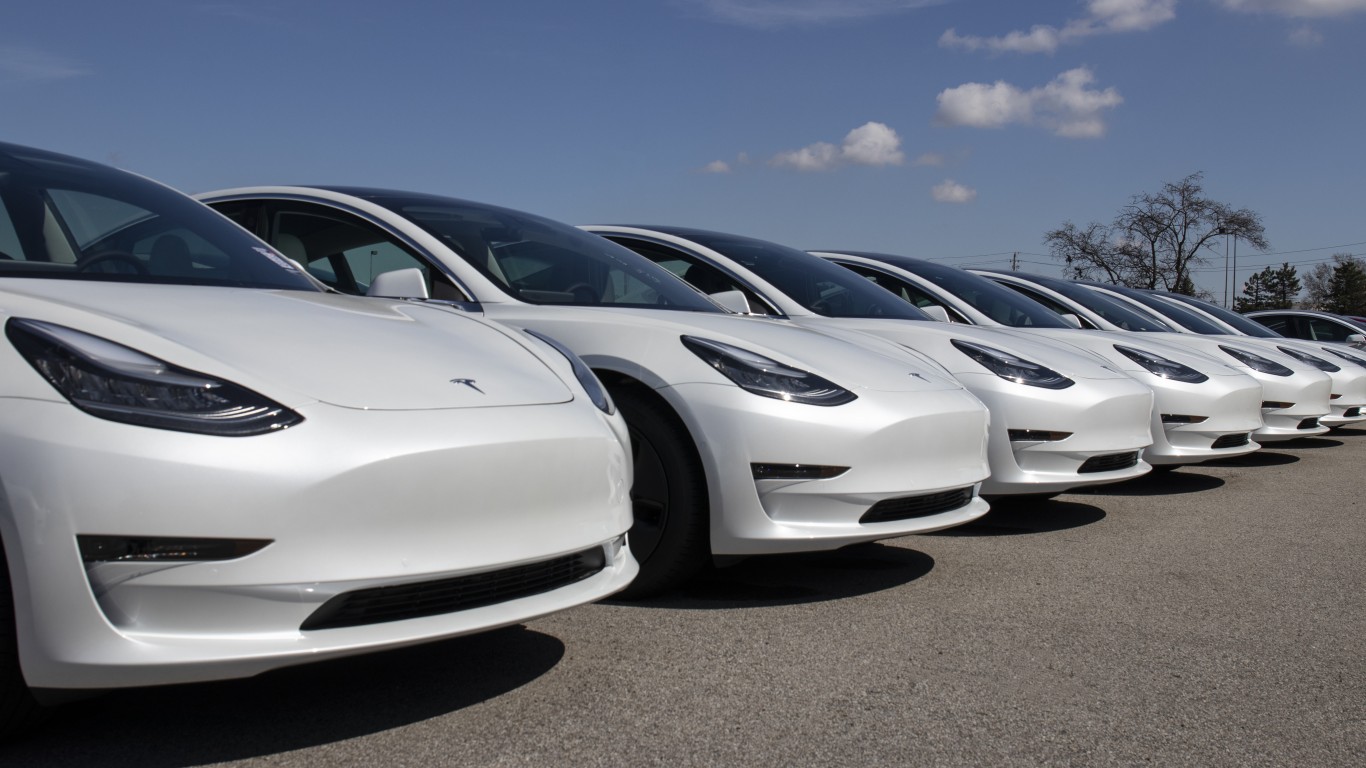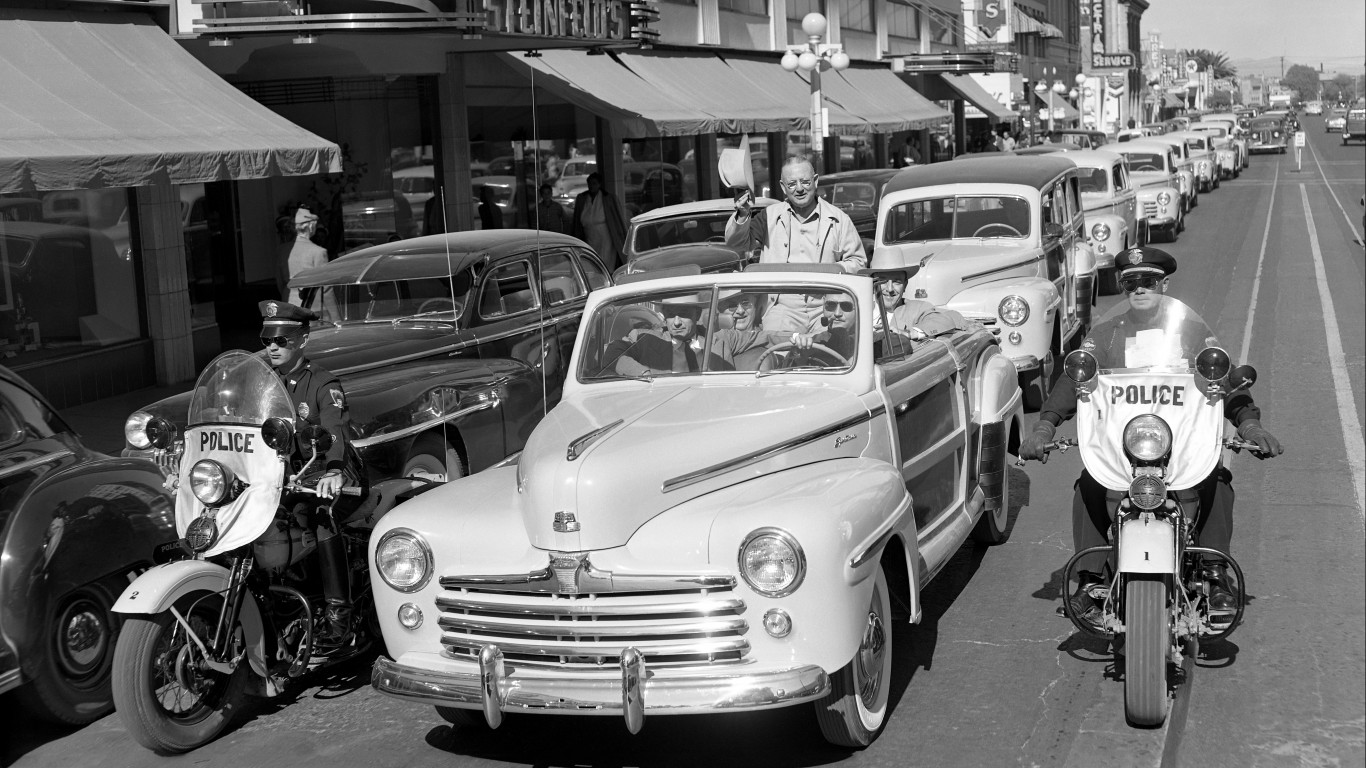 Some vehicles can survive car crashes and protect the occupants much better than others. To find out which motor vehicles perform best and which the worst, nonprofit group Insurance Institute for Highway Safety performed crash tests. IIHS, which is “dedicated to reducing the frequency and consequences of crashes on U.S. roads,” rated the cars in four separate categories. 24/7 Wall St. examined the ratings and identified the seven current-generation models that received a “marginal” or “poor” rating in two of the four categories.
Some vehicles can survive car crashes and protect the occupants much better than others. To find out which motor vehicles perform best and which the worst, nonprofit group Insurance Institute for Highway Safety performed crash tests. IIHS, which is “dedicated to reducing the frequency and consequences of crashes on U.S. roads,” rated the cars in four separate categories. 24/7 Wall St. examined the ratings and identified the seven current-generation models that received a “marginal” or “poor” rating in two of the four categories.
Read: The Most Dangerous Cars in America
The four rating categories of the IIHS tests are: (1) a frontal offset crash test in which the vehicle travels at 40 miles per hour and hits a barrier head-on; (2) a side-impact crash test in which a 3,300 lb. “SUV-like” object strikes the driver side at 31 mph; (3) rollover ratings in which a metal plate hits the corner of a vehicle to determine how much force it can take before rolling over; and (4) a rear-impact protection rating, which focuses on the ability of seats and seat belts to protect against whiplash.
The cars with the worst scores most commonly received poor grades in the rollover and rear impact tests. In both of these tests, six of the seven models received a score of “marginal,” the second-worst grade. The next most common issue was side impact, in which one model received a “marginal” score and two received a “poor” score, the worst grade given in these tests.
The poor ratings of these models does not appear to have affected their sales. In fact, sales of all models are up from last year. In all but one case, according to data provided by Edmunds.com, sales grew at least 19% last year. And while most of these models’ sales are still below 2007 levels, sales the Jeep Wrangler not only increased the most but also jumped 50% since then.
In addition to IIHS ratings, 24/7 Wall St. also looked at several other measures of overall safety and quality for these vehicles. Included in this analysis are Consumer Reports’ ratings, crash safety ratings performed by the National Highway Transportation and Safety Administration, and JD Power’s overall Initial Quality report. Based on our analysis, it appears that these models persistently have quality issues as several received similarly poor reviews from government test ratings. In the JD Power’s study, five of the seven models scored a three or less out of five, and none scored higher than a four.
Several of the models listed in this study had a two-door and four-door version, which were tested separately and each received poor IIHS scores. 24/7 Wall St. referred to the model only once, but mentioned the scores of each version. In addition, one of the vehicles, the Chevrolet Colorado, is essentially identical to another vehicle, the GMC Canyon. General Motors, which makes both vehicles, uses the same frame for both. In this case, 24/7 Wall St. listed only the Canyon, which is the more popular vehicle.
These are the most dangerous cars in America.
1. Ram 1500
> Make: Dodge
> Bad ratings: side-marginal; rollover-marginal
> 2011 sales: 156,983
> Price: $22,120
> JD Power Initial Quality: 2/5
Though Dodge has been offering the half-ton Ram 1500 since 1981, its safety track record has long been unimpressive. From 1998 through 2001, the truck received failing marks from IIHS in frontal offset tests, and was rated “poor” in protecting heads and left legs, as well as in restraining the crash test dummy. Though frontal offset ratings have since received “good” ratings from the IIHS, the vehicle’s side-impact and rollover ratings remain substandard. Curiously, it was the opposite in the National Highway Traffic Safety Administration tests. The agency found fault with the Ram’s performance on frontal impact tests but not with side impact tests. Despite safety concerns, the model has been selling well, and from 2007 to 2011 Dodge sold more than 100,000 trucks each year.
2. Colorado Crew Cab
> Make: Chevrolet
> Bad ratings: side-poor; rollover-marginal; rear-marginal
> 2011 sales: 31,026
> Price: $17,475
> JD Power Initial Quality: 3/5
The Chevrolet Colorado and GMC Canyon crew cab are fundamentally the same light truck made by General Motors (NYSE: GM) with differing cosmetic features. The small pickup performed quite poorly in the IIHS tests, earning a “poor” side-impact grade and “marginal” grades for rollover and rear safety. Sales of the Colorado have been especially poor in recent years; GM sold 75,716 such cars in 2007 and only 31,026 in 2011. Making matters worse, a November, 2011, recall of 5,220 Colorados and Canyons due to seat belt safety concerns did not help either the brand’s sales or its safety record.
3. CX-7
> Make: Mazda
> Bad ratings: rollover-marginal; rear-marginal
> 2011 sales: 35,641
> Price: $22,190
> JD Power Initial Quality: 4/5
Although it will be replaced by the newer CX-5 model next year, the CX-7’s safety record certainly will not be remembered fondly. Despite “good” scores in front and side impact ratings, low grades in rollover and rear-impact measures go against perceptions that the CX-7 is a safe car to drive. Sales rose from about 20,000 in 2009 to 35,641 in 2011. Still, this is down from 2007 when 42,199 CX-7 cars were sold.
4. CX-9
> Make: Mazda
> Bad ratings: rollover-marginal; rear-marginal
> 2011 sales: 34,421
> Price: $29,725
> JD Power Initial Quality: 4/5
Assembled in Hiroshima, Japan, the Mazda CX-9 received “marginal” scores in both rollover and rear safety ratings. The CX-9 also had the lowest strength-to-weight ratio of all midsize SUVs tested by the IIHS. This ratio measures how much force a car’s roof can handle before it crushes five inches, and then it is divided by the weight of the car. Despite these poor ratings, the number of CX-9s sold increased from 25,484 in 2007 to 34,421 in 2011.
5. Pathfinder
> Make: Nissan
> Bad ratings: rollover-marginal; rear-marginal
> 2011 sales: 25,935
> Price: $29,290
> JD Power Initial Quality: 3/5
The Nissan Pathfinder earned “marginal” ratings in rollover and rear-impact testing from the IIHS. The Pathfinder’s performance in government rollover tests is likewise troubling, as it registered an estimated 20% to 30% risk of rolling over during testing. At a price of $29,290, the cost of a Pathfinder is similar to that of the Mazda CX-9 or the 4-door Jeep Wrangler. According to Edmunds sales figures, both these models have outsold the Pathfinder in the past three years.
6. Wrangler
> Make: Jeep
> Bad ratings: side-marginal (2-door), side-poor (4-door); rear-marginal (both)
> 2011 sales: 122,460 (all Wranglers), 46,803 (2-door), 75,657 (4-door)
> Price: $22,970 (2-door), $30,745 (4-door)
> JD Power Initial Quality: 3/5
With “marginal” ratings in side and rear-impact protection, the two-door Wrangler joins other SUVs, such as the CX-7, CX-9 and Pathfinder, as a poor performer in IIHS tests. One of the few car models that actually underperforms the two-door Jeep Wrangler is the larger four-door version. This version of the Wrangler also received a “marginal” rear-impact rating, yet was also given a “poor” side-impact rating. During a recent IIHS side-impact test, a dummy was struck by the steel bars supporting the four-door Wrangler’s convertible roof. Both of the models’ overall poor performance stems in part from the fact they were unable to protect the driver’s or back-seat passengers’ heads and other bodily parts in simulated accidents. Despite earning the lowest score of any mid-size SUV from Consumer Reports, the Wrangler still sells especially well with more than 120,000 sold in the U.S. in 2011.
7. SX4
> Make: Suzuki
> Bad ratings: rollover-marginal, rear-marginal
> 2011 sales: 12,520
> Price: $13,849
> JD Power Initial Quality: 2/5
The least-expensive car on this list, the Suzuki SX4 performed poorly in rollover and rear-test ratings. Among the more than 30 small cars tested by the IIHS, the SX4 was the only small car to receive two scores of “marginal” or “poor” out of four ratings. Similarly, the SX4 also received a “fair” rating, the second-lowest possible, in government side-crash testing. The model’s U.S. sales also have languished, falling from 30,166 in 2008 to 12,520 last year.
Michael B. Sauter
Want to Retire Early? Start Here (Sponsor)
Want retirement to come a few years earlier than you’d planned? Or are you ready to retire now, but want an extra set of eyes on your finances?
Now you can speak with up to 3 financial experts in your area for FREE. By simply clicking here you can begin to match with financial professionals who can help you build your plan to retire early. And the best part? The first conversation with them is free.
Click here to match with up to 3 financial pros who would be excited to help you make financial decisions.
Have questions about retirement or personal finance? Email us at [email protected]!
By emailing your questions to 24/7 Wall St., you agree to have them published anonymously on a673b.bigscoots-temp.com.
By submitting your story, you understand and agree that we may use your story, or versions of it, in all media and platforms, including via third parties.
Thank you for reading! Have some feedback for us?
Contact the 24/7 Wall St. editorial team.



